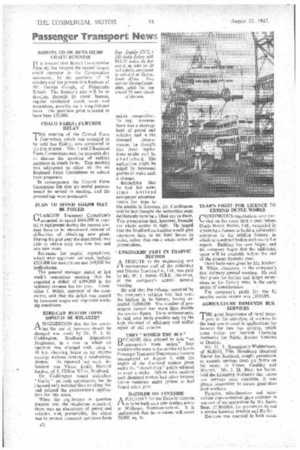Passenger Transport News
Page 30

If you've noticed an error in this article please click here to report it so we can fix it.
BRISTOL CO-OP. BUYS 155,000 COACH BUSINESS IT is learned that Bristol Co-operative 1 Society has become the second largest coach operator in the Co-operative movement, by the purchase of 24 coaches and the private-hire business of Mr. George Gough,, of Fishponds, Bristol. The Society's .aim will be to develop, through its travel bureau, iegular conducted coach tours and excursions, possibly on a long-distance basis. The purchase price is stated to have been £55,000.
COACH FARES : FURTHER DELAY
THE meeting of the Central Fares Committee, which was arranged to be held last Friday, was postponed at the last minute. Nos. 1 and 2 Regional Fares, Committees met the previous day to discuss the question of seeking increases in coach fares. That meeting was adjourned to allow all the six Regional Fares Committees to submit their proposals.
In consequence, the Central Fares Committee felt that no useful purpose would be served in meeting, and the proceedings were postponed.
PLAN TO SPEND 1644,000 MAY BE FOILED
GLASGOW Transport Committee's proposal to spend £644,000 in capital re-equipment during the current year may have to be abandoned because of difficulties of obtaining new plant. During the past year the department was able to obtain only one new bus and one new tram.
Estimates for capital expenditure, which were approved last week, include £225,000 for motorbuses and £49,000 for trolleybuses.
The general manager stated at last week's committee meeting that he expected a deficit of £199,000 in the ordinary revenue for the year. Councillor J. Welsh, convener of the committee, said that the deficit was caused by increased wages and improved working conditions HIRE-CAR RESTRICTIONS SHOULD BE RELAXED?
A SUGGE,ST1ON that the law cover
ing the use of hire-cars should be changed was made by Dr. F. I. 0. Coddington, Bradford Stipendiary Magistrate, in a case in which an operator was charged with using a 10 h.p. shooting brake as an express carriage without holding a road-service
licence. As reported last week, defendant was Victor Leslie Barnard Jordan, of 1, Clifton Villas, Bradford.
Dr. Coddington found defendant " Guilty " on both summonses, but he imposed only nominal fines totalling 10s. and refused' the prosecution's application for 24s. costs.
When the regulations in question became law, the magistrate remarked. there was an abundance of petrol and vehicles, and, presumably, the object was to protect transport operators from
FOUT Daimler CVG. 6 DD douhle-deckers with M.C.W. bodies, the first part of an order for 20 such vehicles, were recently unloaded at Durban, South Africa. They were for Durban Corporation, which has now ordered 54 more chassis of this type.
unfair competition. To day, however, there was a shortage both of petrol and vehicles, and in the
changed ci rcumstances he thought that these regulations might well be abolished. The authorities might be asked by interested parties to make such a change.
Remarking that he had for some time noticed newspaper advertisements for trips to the seaside in hire-cars, Dr. Coddington said he had thought the authorities were deliberately turning a blind eye to them. This prosecution had, however, brought the whole matter to light. He hoped that the Bradford authorities would give operators time to set their house in order, rather than run a whole series of prosecutions.
• ENGINEERS' PART IN TRAFFIC RECORD
ATRIBUTE to the engineering and maintenance staff of the Aldershot and District Traction Co., Ltd., was paid by Mr. W. T. James, 0.B.E„ chairman, at the company's annual general meeting.
He said that the mileage operated by the company's vehicles was, last year, the highest ii'. its history, having exceeded 10,000,000. The number of passengers carried was more than double the pre-war figure. These achievements, he said, were made possible only by the high standard of efficiency and skilful repair of old vehicles.
THEY "MISSED THE BUS"
BECAUSE they refused to join "an appropriate trade union," four workers who were in the service of Leeds Passenger Transport Department became unemployed on August 9, with the expiry of the dismissal notices given under the " closed-shop " policy adopted to avert a strike. Others who received such dismissal notices had either become Union members under protest or had found other jobs.
DAIMLER ON TYNESIDE
A FACTORY for the Daimler concern r-1 is to be built on a new trading estate at Wallsend, Northumberland. It is understood that the premises will cover 30,000 sq. ft.
YEAR'S FIGHT FOR LICENCE TO EXTEND DUPLE WORKS
rONTINUOUS negotiations were car
ried on for more than a year before Duple Motor Bodies, Ltd., succeeded in obtaining a licence to build a substantial extension to the existing factory, in which to construct bodies exclusively for export. Building has now begun and the company hopes that the additional space will be available before the end of the present financial year.
These facts were given by Mr. Herbert R. White, chairman, at the company's first ordinary general meeting. He said that plans for further and larger extensions to the factory were in the early stages of consideration.
The company's profit for the 81 months under review was £119,085.
AGRICULTURE DEMANDS BUS SERVICES
THE great importance of rural transport in the attraction of workers to the land was stressed in applications for licences for new bus services, which came before the Scottish Licensing Authority for Public Service Vehicles at Dundee.
Mr. H. J. Scrymgeour-Wedderburn, of Birkhill, Fife, Hereditary Standard Bearer for Scotland, sought permission to operate services from six farms on his estate to Cupar, Gauldry and Wormit. Mr. J. M. Burr, his factor, told the Licensing Authority that unless bus services were available, it was almost impossible to secure good-class land workers.
Farmers, schoolmasters and sanatorium representatives gave evidence in support of an application by Mr. James Bean, of Brechin, for permission to run a service between Brechin and Forfar.
Decision was reserved in both cases.
















































































